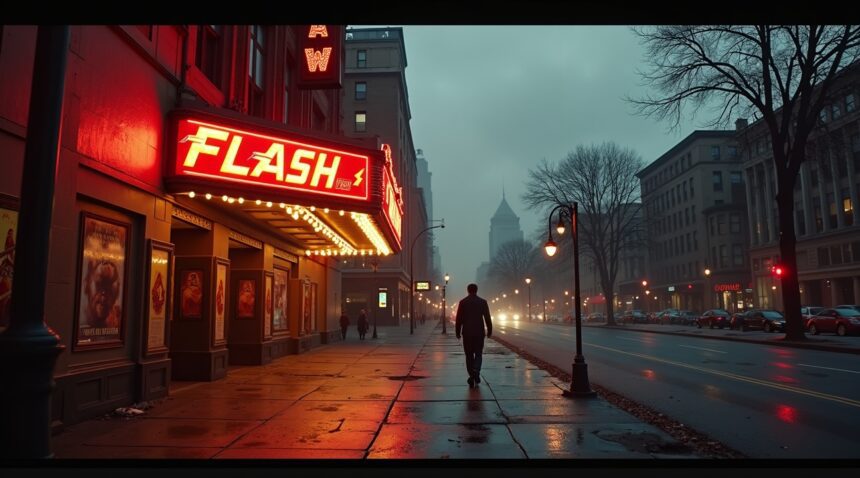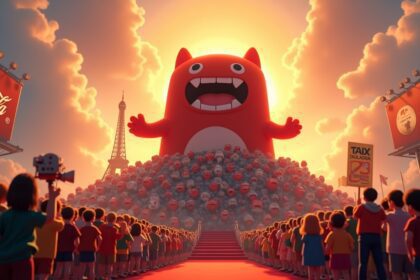The Flash movie narrowly avoided being technically canceled, but it ended up as one of 2023’s most dramatic box office disappointments, despite Warner Bros. Discovery’s hefty $200 million investment.
The film managed to gross only $271 million globally, significantly underperforming compared to the estimated $400 million needed to break even. A combination of controversy, marketing missteps, and internal studio decisions contributed to its financial failure. Among these were actor Ezra Miller’s ongoing legal issues, lukewarm reception across most audience groups, and a studio announcement that undercut the film’s relevance within the DC cinematic universe.
Key Takeaways
- Massive financial loss: The Flash reportedly lost around $129 million, earning just $271 million globally against a $200 million production budget, not including marketing expenses.
- Audience disconnect: Director Andy Muschietti admitted the film failed to connect with any of the four major audience demographics, with particularly poor reception from female viewers of all ages.
- Premature reboot announcement: Warner Bros.’ announcement of James Gunn’s upcoming DC Universe reboot discouraged audiences by implying that The Flash‘s storyline wouldn’t impact the franchise’s future direction.
- Controversial lead actor: Ezra Miller’s legal troubles and problematic public behavior drew negative media attention, dampening the film’s promotional efforts.
- Development turmoil: The film suffered years of development delays and creative turnover, cycling through multiple directors and writers which led to an inconsistent storyline and vision.
The Flash’s $200 Million Production Budget Couldn’t Save It From Box Office Disaster
Warner Bros. Discovery invested heavily in The Flash, allocating a substantial $200 million production budget for what they hoped would be a blockbuster superhero film. However, the movie’s financial performance told a different story entirely.
The Flash managed to gross only $108 million domestically, a disappointing figure that immediately signaled trouble for the studio. Even when combined with international box office receipts, the film’s global total reached just $271 million. This performance fell dramatically short of industry expectations for a major superhero release.
Financial Reality Check
Studios typically need films to earn approximately double their production budget to break even when accounting for various costs. This means The Flash needed to generate around $400 million worldwide to reach profitability. The actual figures paint a stark picture:
- Production budget: $200 million
- Domestic gross: $108 million
- Global gross: $271 million
- Break-even target: ~$400 million
- Shortfall: ~$129 million
These numbers don’t even include the substantial marketing expenses that Warner Bros. Discovery incurred promoting the film. Marketing budgets for major superhero films often match or exceed production costs, potentially adding another $100–200 million to the total investment.
The financial disaster became even more apparent when considering that major superhero films typically earn the majority of their revenue during opening weekend and the first few weeks of release. The Flash movie faced cancellation discussions even before its release, and the box office performance validated those concerns.
Industry analysts quickly labeled The Flash a “box office bomb,” a term reserved for films that lose significant money relative to their investment. The combination of the high production budget, disappointing global gross, and mounting financial losses created a perfect storm of commercial failure.
This poor performance had immediate implications for DC’s film strategy. Warner Bros. Discovery had positioned The Flash as a cornerstone of their superhero universe, hoping it would launch multiple sequels and spin-offs. Instead, the financial disappointment forced the studio to reconsider their entire approach to DC properties.
The film’s box office failure also highlighted the importance of star power and positive audience reception in the superhero genre. Despite featuring popular characters and impressive visual effects, The Flash couldn’t overcome the various challenges that plagued its journey to theaters, ultimately resulting in one of the most expensive commercial disappointments in recent superhero cinema history.

Why Audiences Simply Don’t Care About The Flash Character
The Flash movie struggled to gain traction with moviegoers across all major demographic groups, a critical factor that ultimately contributed to its disappointing performance. Director Andy Muschietti acknowledged that the film failed to connect with what the industry calls the four quadrants – men under 25, women under 25, men over 25, and women over 25. This broad demographic disconnect revealed a fundamental issue with the character’s appeal.
The Female Audience Problem
Muschietti specifically identified that The Flash faced particular challenges in attracting female viewers across both age groups. The character simply didn’t resonate with women, who represent a crucial portion of the superhero movie audience. Several factors contributed to this disconnect:
- The Flash lacks the broad emotional appeal that characters like Wonder Woman or even Spider-Man possess
- Barry Allen’s character development often focuses on technical aspects of his powers rather than relatable personal growth
- Female audiences showed limited interest in the time-travel and multiverse concepts central to the film
- The character’s comedic elements didn’t translate effectively to female demographics
This demographic challenge extended beyond just female viewers. Many general audiences found themselves indifferent to The Flash as a character, viewing him as less compelling compared to established heroes like Batman, Superman, or even newer additions to the DC roster. The character’s relative obscurity outside of comic book circles meant that casual moviegoers lacked the emotional investment that drives box office success.
The timing couldn’t have been worse for a character already struggling with audience connection. Ezra Miller’s personal controversies further complicated the situation, creating additional barriers to audience engagement. Even attempts at reshoots and story adjustments couldn’t overcome the fundamental issue that audiences simply weren’t invested in Barry Allen’s story.
The four-quadrant failure highlighted a critical misjudgment in DC’s strategy. While the character works well in ensemble pieces or television formats, The Flash lacked the universal appeal necessary for a standalone blockbuster film. The movie’s premise assumed audience familiarity and investment that simply didn’t exist, leaving it unable to generate the widespread enthusiasm needed for commercial success. This disconnect between character appeal and audience interest became a defining factor in the film’s ultimate downfall.
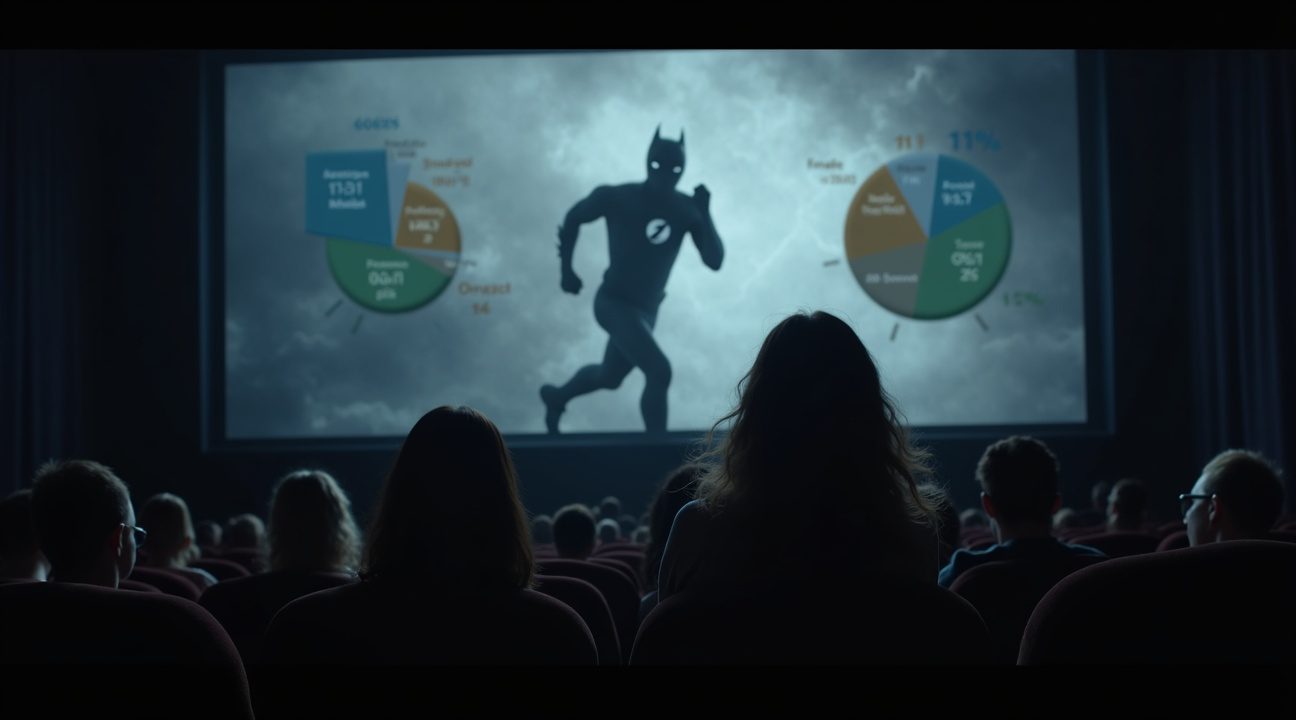
How DC’s Reboot Announcement Killed Audience Investment
Warner Bros. Discovery made a critical error in timing when they announced James Gunn’s DC Universe reboot before The Flash movie faced cancellation amidst Ezra Miller issues. This premature revelation essentially pulled the rug out from under audience investment months before the film’s release. Fans discovered that whatever happened in The Flash would ultimately be irrelevant to future DC projects, creating an immediate disconnect between viewers and the story they were being asked to care about.
The reboot announcement transformed The Flash from a potentially pivotal DC film into what many perceived as expensive closure for a dying continuity. Audiences had already endured years of inconsistent storytelling across the DC Extended Universe, and knowing that none of these narrative threads would continue forward eliminated any remaining emotional stakes. I’ve observed this phenomenon before in franchise filmmaking—once viewers know a storyline is ending, their psychological investment drops dramatically.
The Psychology of Dead-End Storytelling
When studios telegraph that current storylines won’t matter in future installments, they inadvertently communicate that audiences shouldn’t invest emotionally in present content. The Flash suffered from this exact problem, as fans understood that character developments, relationship dynamics, and universe-building elements would be discarded after the credits rolled. This knowledge created a viewing experience similar to watching a cancelled television series—technically competent but emotionally hollow.
The X-Men franchise experienced similar audience detachment during its final phase when Fox’s acquisition by Disney made reboot inevitable. Viewers approached those later films with reduced enthusiasm because they knew the storylines wouldn’t continue. The Flash faced identical circumstances, compounded by the additional baggage of Ezra Miller’s controversies that had already damaged audience confidence.
James Gunn’s appointment as creative head represented positive change for DC’s future, but the timing of that announcement proved disastrous for existing projects. Rather than allowing The Flash to stand on its own merits, the studio essentially branded it as part of a failed experiment that audiences should prepare to forget. This messaging strategy guaranteed that even successful elements of the film would feel temporary rather than meaningful.
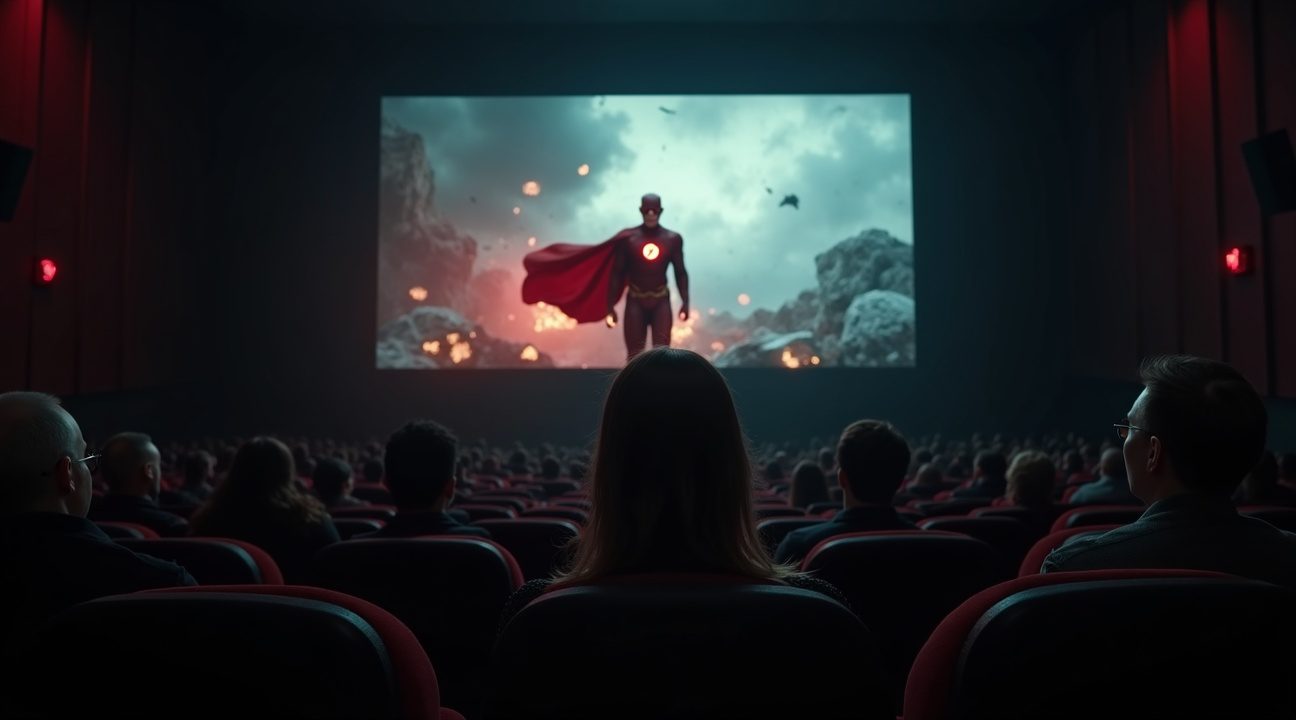
The Ezra Miller Controversy That Overshadowed Everything
The Flash found itself trapped in a PR nightmare long before audiences ever saw it on screen. Ezra Miller’s string of legal troubles and controversial behavior created a shadow that loomed over every aspect of the film’s production and marketing campaign.
A Timeline of Troubles
Miller’s offscreen incidents began piling up during the film’s post-production phase. These controversies ranged from legal issues to concerning public behavior, creating a publicity storm that Warner Bros. struggled to contain. The studio faced an unprecedented challenge – how do you market a superhero film when your lead actor becomes the story for all the wrong reasons?
I’ve rarely seen a major blockbuster deal with such sustained negative press. Miller’s apology came after months of mounting pressure, but by then, the damage to The Flash‘s reputation seemed irreversible. Industry insiders watched as each new headline further complicated the film’s chances at the box office.
The Director’s Perspective vs. Public Perception
Director Andy Muschietti offered a different take on the situation’s impact. He argued that while the Miller controversy certainly didn’t help, it wasn’t the primary reason for The Flash‘s poor performance. Muschietti pointed to broader industry trends, including superhero fatigue and changing audience preferences, as more significant factors.
However, many industry observers disagreed with this assessment. The controversy forced Warner Bros. to limit traditional promotional activities and created a toxic association with the brand. Reshoots became complicated as the studio grappled with whether to continue with Miller or explore alternatives.
The situation reached a critical point when Miller faced potential jail time, raising questions about the actor’s availability for future projects. This uncertainty extended beyond just promotional duties – it threatened the entire DC Extended Universe’s planned trajectory.
Marketing executives found themselves in an impossible position. Traditional promotion strategies became minefields, with every interview or public appearance carrying potential risks. The film’s budget had already committed hundreds of millions of dollars, making cancellation financially devastating despite the ongoing controversies.
Cancellation discussions reportedly occurred multiple times during production, but Warner Bros. ultimately decided to proceed. The studio’s investment was too substantial to abandon, even as the controversy continued to generate negative headlines that overshadowed any positive buzz about the film itself.
The Long Road of Creative Struggles and Production Hell
The Flash movie’s development history reads like a masterclass in how not to manage a major studio project. I’ve watched this character’s journey span multiple decades, with false starts dating back to the late 1980s when various writers and directors attempted to crack the code of bringing DC’s fastest man alive to the big screen.
Creative Revolving Door
The project’s instability became apparent as filmmaker after filmmaker joined and departed the production. Directors like David S. Goyer, Seth Grahame-Smith, Rick Famuyiwa, and Jonathan Goldstein and John Francis Daley all signed on at different points, only to leave due to creative differences with Warner Bros. Each departure reset the creative vision, forcing new scripts and completely different approaches that never built upon previous work.
The 2007–2008 Writers Guild strike dealt another significant blow to the project’s momentum. The Flash movie’s cancellation threats became a recurring theme throughout its development, with each creative shake-up bringing renewed speculation about whether the film would ever see theaters.
Development Hell’s Impact
This prolonged creative instability created several critical problems that plagued the final product:
- The constant rewrites and directorial changes meant the film lacked a consistent vision or tone.
- Scripts were rewritten so many times that core story elements became muddled.
- Character development suffered from years of different interpretations.
Production finally moved forward under director Andy Muschietti, but the damage from years of starts and stops had already been done. The film’s eventual release felt disconnected from the original excitement surrounding The Flash as a character worthy of his own solo adventure.
Warner Bros.’ inability to maintain creative consistency reflected broader issues within their DC film strategy during this period. Ezra Miller’s personal controversies added another layer of complexity to an already troubled production, though the creative struggles predated these issues by more than a decade.
The extended development cycle also meant the film was constantly competing against changing audience expectations and evolving superhero movie standards. What might have worked as a Flash movie concept in 2010 felt outdated by the time cameras actually rolled. This disconnect between original creative intent and final execution contributed to the film’s lukewarm reception and commercial disappointment.
The Flash’s production hell serves as a cautionary tale about the importance of maintaining creative vision and decisive leadership in major film projects. Years of indecision and creative turnover ultimately undermined what could have been a straightforward superhero origin story.
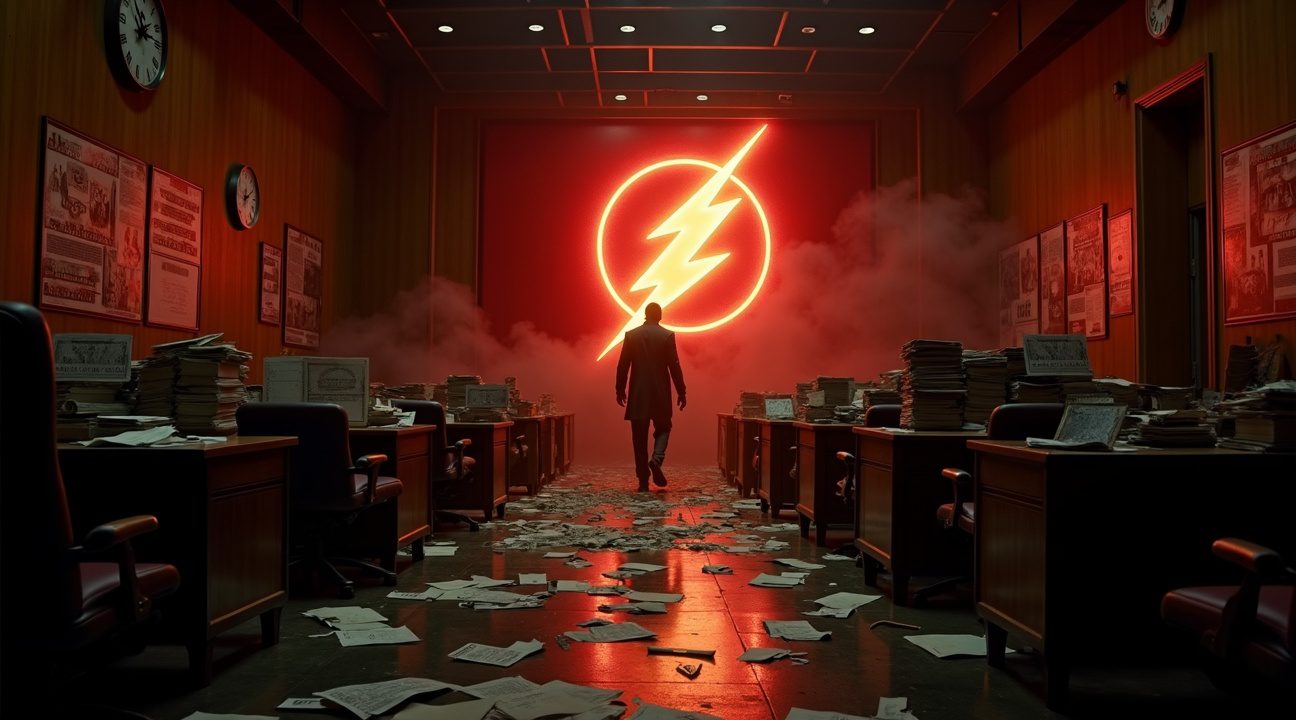
Sources:
Screen Rant, “The Flash Director Addresses Why The DC Movie Bombed At The Box Office”
Winter Is Coming, “Director says The Flash movie failed because people ‘just don’t care about the flash'”
Finding God in the World of Video Games, “Flashpoint Failure – The Real Reason Behind the Flash Flop”
E. Stephen Burnett, “Ten Top Reasons Why ‘The Flash’ Has Flopped”
Cancelled Movies Wiki, “The Flash”

